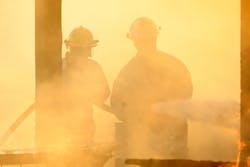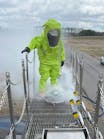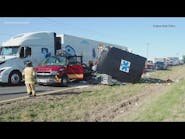A firefighter’s job is unlike any other. We wear our pride and dedication to our careers on our sleeves, on the windows of our cars or tattooed on our bodies. All my life growing up I wanted to be involved in the fire service. It helped that my dad, grandfather, and great grandfather were all firefighters—not to mention my uncle and two cousins. I really didn’t have much of a choice. I remember walking into the engine room, running up and ringing the bell on the front of the truck, smelling the fire gear hanging on the racks and playing the pinball games.
I started as a junior firefighter in 1994. They changed the bylaws that year and moved the age up just so I could join the ranks sooner. I work the bingo events every Friday night and set up for the weddings on the weekends. I took every fire school that was available. I wanted to learn everything as fast as I could.
Looking back on all the training that was available, there was one class they forgot: how to respond to your own mental health.
The trauma that we see as firefighters on a daily basis will take a toll on people. Understanding how to deal with your body’s reactions to trauma may put you ahead of the game. Taking advantage of simple ways to recognize that we’re starting to struggle mentally with what we see on the job may be as important as life or death.
Currently, the number of suicides in the fire service is unprecedented. Organizations such as The Firefighter Behavioral Health Alliance are trying to tackle these issues. Simple warning signs that you can look out for in yourself are crucial for your career and your overall mental health. So ask yourself: Would I know if I’m struggling mentally? Would you be able to tell if you need some simple mental health help? Here are some of the signs from Mental Health America that you can look out for:
- Confused thinking
- Prolonged depression (sadness or irritability)
- Feelings of extreme highs and lows
- Excessive fears, worries and anxieties
- Social withdrawal
- Dramatic changes in eating or sleeping habits
- Strong feelings of anger
- Delusions or hallucinations
- Growing inability to cope with daily problems and activities
- Suicidal thoughts
- Denial of obvious problems
- Numerous unexplained physical ailments
- Substance abuse
If you’re experiencing any of the above symptoms it may be time to ask for help. There are many resources at your disposal. If you’re reading this and you aren’t experiencing any of these symptoms, then ask yourself: If I were experiencing these symptoms would I know what to do? Would I know where to go? If you don’t, then this may be the opportunity to start putting resources in place for your department so that when you or someone in the department is having an issue, your entire crew knows what to do.
Seeking help through your department’s employee action plan (EAP) is a good step. EAPs offer many services that all departments can take advantage of. If you’re in a volunteer department, look at the National Volunteer Fire Council’s “Share the Load” program. There are many resources at your disposal that are free. Establishing a peer support network throughout your department is a good way of having caring individuals who are willing to be there at a moment of crisis. The National Fallen Firefighters Foundation also has the 16 Life Safety Initiatives and Initiative 13 focuses on Behavioral Health. They have many different tools that you can put into your behavioral health toolbox.
I personally would like to see behavioral health training required at every fire training center in the country. This type of training should be as important as any other training you are required to attend. Take a look at the resources below and don’t be afraid to reach out if you need help.
Resources and Organizations
- NVFC's Member Assistance Program
- NVFC's Share The Load Program
- Life Safety Initiative 13
- Firefighter Behavioral Health Alliance
- Firefighters Support Foundation
- Federation of Fire Chaplains
- International Critical Incident Stress Foundation
- National Fallen Firefighters Foundation
- The Code Green Campaign
- Firefighter Close Calls
MARK LAMPLUGH is a fourth-generation firefighter and former captain with the Lower Chichester, PA, Fire Company. He is the CEO of 360 Wellness Inc. (www.360wellness.org) and a consultant with Sprout Health Group (www.sprouthealthgroup.com). Lamplugh is also nationally recognized in Crisis Stress Intervention through the American Academy of Experts in Traumatic Stress. He has helped hundreds of firefighters, police officers, veterans, EMS personnel, and civilians nationwide find help for addiction, alcoholism, PTSD, and mental health support. He can be reached for comment at [email protected].






